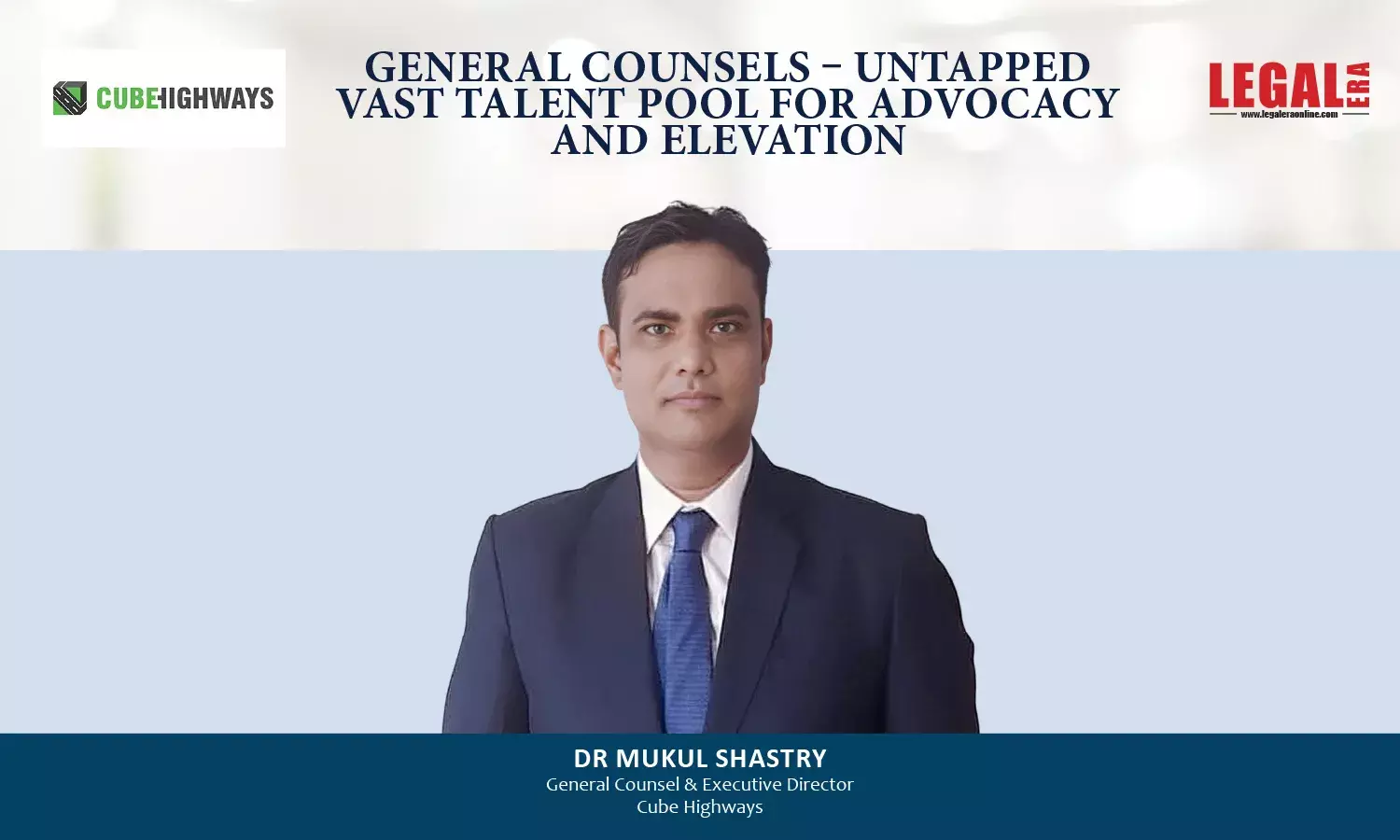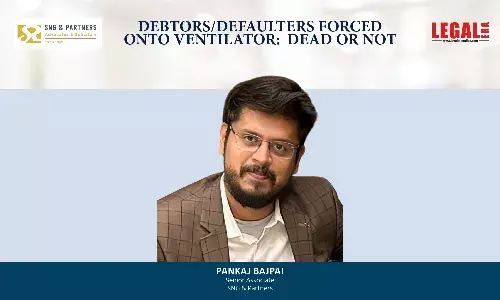General Counsels – Untapped Vast Talent Pool For Advocacy And Elevation

General Counsels – Untapped Vast Talent Pool For Advocacy And Elevation By allowing GCs to practice law and represent clients, not only will we have a vast talent pool of lawyers from which the client can choose their lawyers (external or internal) but it will also allow development of new jurisprudence The role of general counsels (GCs) has undergone a significant transformation in...
General Counsels – Untapped Vast Talent Pool For Advocacy And Elevation
By allowing GCs to practice law and represent clients, not only will we have a vast talent pool of lawyers from which the client can choose their lawyers (external or internal) but it will also allow development of new jurisprudence
The role of general counsels (GCs) has undergone a significant transformation in recent years. Traditionally viewed as mere paper pushers between management and external lawyers, GCs today often navigate complex legal landscapes, participate in high-stakes litigation, and provide strategic counsel on matters that intersect law, business, and ethics. Despite their pivotal role in the legal ecosystem, GCs are not allowed to practice law or to represent clients before court or tribunals and are accordingly ineligible for elevation to the judiciary.
This piece argues that GCs and in-house counsels should be treated as advocates and deemed eligible for appearing before judicial forums and also for judicial appointments, considering their unique contributions and the evolving nature of their work.
The Evolving Role of General Counsels
In today’s globalized and highly regulated environment, the responsibilities of GCs extend far beyond offering routine legal advice. GCs frequently manage litigation portfolios, negotiate settlements, and oversee the work of external counsel in complex legal disputes. Their engagement in advocacy—albeit within the confines of their organization—mirrors the role of traditional courtroom lawyers.
Furthermore, GCs often grapple with ethical dilemmas, balancing the interests of the organization with the rule of law and broader societal concerns. This dual responsibility enhances their capacity for nuanced decision-making, a skill highly relevant for judicial roles.
Bridging Legal Expertise with Practical Wisdom
Judges are not mere arbiters of legal texts; they are custodians of justice who must understand the practical implications of their rulings. GCs are uniquely positioned to bridge this gap. Their roles demand a keen understanding of both legal principles and their real-world applications.
Further, the judiciary thrives on diversity—not only in terms of gender, ethnicity, and socioeconomic background but also in professional experience. Allowing GCs/in-house counsels to argue and elevating them to the bench would infuse the judiciary with fresh perspectives, especially on commercial and corporate disputes. Their insights into the internal workings of organizations, regulatory compliance, and risk management would enrich judicial deliberations, particularly in cases involving complex business issues.
Addressing Concerns
Critics may argue that GCs lack the direct courtroom experience traditionally associated with judicial candidates. However, this concern can be addressed by assessing the depth and breadth of their advocacy skills in non-litigation contexts. Moreover, many GCs actively engage with external counsel in litigation, contributing to case strategy and arguments, which provides them with indirect but substantial courtroom exposure.
Critics may argue that GCs lack the direct courtroom experience traditionally associated with judicial candidates
Why can’t GCs be allowed to practice law before Courts/Tribunals
At present the GCs are not allowed to appear before the court and Rule 49 of the Bar Council of India (“Rule 49”) bars full-time salaried employees practising legal profession or representing clients as lawyers.
In a significant ruling, the Supreme Court in 2018 (Bench of the then Chief Justice Dipak Misra, Justice AM Khanwilkar and Justice DY Chandrachud) ruled that members of Parliament (MP) and members of legislative assemblies (MLAs) cannot be barred from practicing legal profession or representing a client as lawyers.1
The apex court made it clear that Rule 49 is applicable only to full-time salaried employees, and does not cover legislators within its ambit. Now if the MPs/MLAs who are also involved in partisan politics and have office of profit are allowed to continue practice, why cannot the GCs and in-house counsels represent their employer in a court of law.
By this narrow definition, not only the legal fraternity is deprived of the talent available in the private sector who at times understand their sector far better than the lawyers and judges who have never worked in that sector; but this also violates the basic fundamental rights of these lawyers. They chose the profession to service it at all levels, now taking away their right to practice law or represent client takes away the very fundamental right for which they had chosen to do law.
GCs to Judge
While instances of GCs being directly elevated to judicial positions are relatively uncommon, Colorado, Maryland and other US states allow a non-lawyer to be a judge. So theoretically there is a possibility of even a non-lawyer to be a judge, leave alone the law qualified GCs.2
The classic case of Justice Michelle O’Bonsawin, the first in-house lawyer to be appointed as Supreme Court Judge of Canada puts forth the merit of having GCs elevated to the top judiciary.3 O’Bonsawin, who was appointed to the country’s top court a little over a year ago, was general counsel for the Royal Ottawa Health Care Group and before that was counsel for Canada Post and a legal researcher with the Royal Canadian Mounted Police.4
“I think that as a GC, we’re exceptionally good at problem solving and balancing different obligations,” said Justice Michelle O’Bonsawin in a Q&A at Canada’s National GC Network conference Monday.5
It illustrates that, although not commonplace, the elevation of general counsels to judicial positions does occur, reflecting the recognition of their extensive legal expertise and the valuable perspective they bring to the judiciary.
Conclusion
General counsels play an indispensable role in the legal ecosystem, blending advocacy, legal expertise, and ethical decision-making. Treating them as advocates and making them eligible for elevation as judges is a logical and progressive step that acknowledges the evolving nature of legal practice. By allowing GCs to practice law and represent clients, not only will we have a vast talent pool of lawyers from which the client can choose their lawyers (external or internal) but it will also allow development of new jurisprudence. The perspective of in-house counsel when heard directly by the judge will give a new direction to the judicial approach to various problems of corporates.
By including GCs in the pool of potential judicial appointees, the judiciary can enhance its diversity, broaden its perspective, and better serve the interests of justice in a complex and dynamic world.
Disclaimer – The views expressed in this article are the personal views of the authors and are purely informative in nature.
2. https://scholarship.kentlaw.iit.edu/cgi/viewcontent.cgi?article=2266&context=cklawreview (visited on Dec 27, 2024 10.35 PM)
3. https://www.law.com/international-edition/2023/11/22/why-in-house-skills-translate-well-to-life-as-a-judge-according-to-top-canada-justice/?slreturn=20241227130611 (visited on Dec 27, 2024 10.35 PM)
4. ibid
5. ibid





